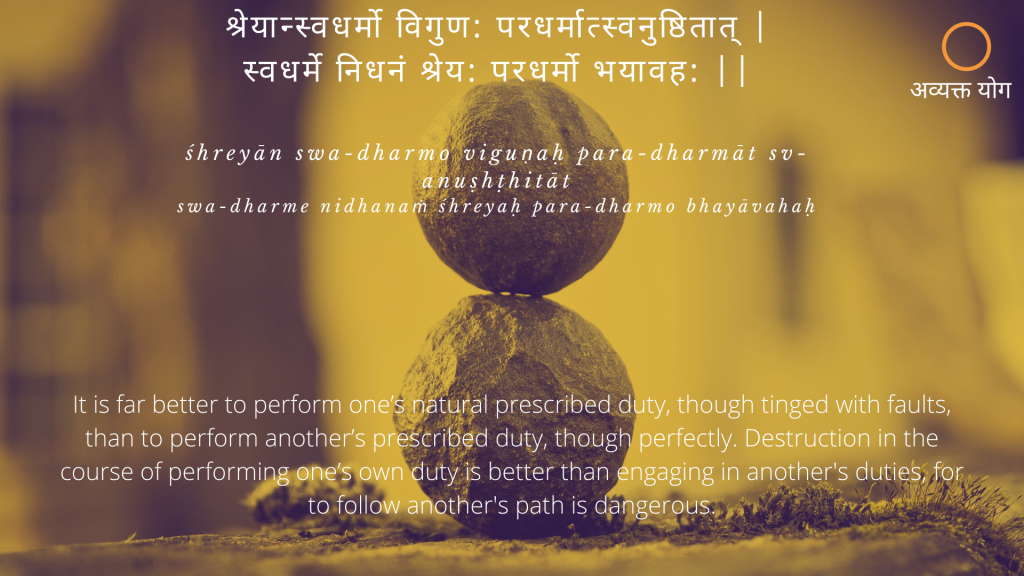I chanced upon an article that I wrote earlier, about swadharma.
I spoke with an investment banker today, one who has been struggling for a while. He is unable to make new clients, unable to even get meetings with big-ticket investors, a career of 20 years seems on the decline.
As I was speaking with him, I got around to asking him what he would do if things didn’t work out for some more time. “Oh, well, I will just give it up and open a restaurant”, he replied.
“Then why didn’t you do it in the first place?” I asked.
No response for a while, and then he came up with an excuse (the “I had to make money for a while” types).
It is important to look back from time to time, not to be nostalgic, but to review what we are currently doing, and whether we are happy doing it.
Swadharma is about doing what comes naturally to you, what justifies your natural talents and what we are about to be excited about. This is what leads to happiness, nothing else.
And so I came back, and looked back at this article, and found it to be quite relevant to the conversation that I had.
Here it is, for you. Do read it.
श्रेयान्स्वधर्मो विगुण: परधर्मात्स्वनुष्ठितात् |
स्वधर्मे निधनं श्रेय: परधर्मो भयावह: ||
śhreyān swa-dharmo viguṇaḥ para-dharmāt sv-anuṣhṭhitāt
swa-dharme nidhanaṁ śhreyaḥ para-dharmo bhayāvahaḥ
Srimad Bhagavad Gīta 3.35
It is far better to perform one’s natural prescribed duty, though tinged with faults, than to perform another’s prescribed duty, though perfectly. Destruction in the course of performing one’s own duty is better than engaging in another’s duties, for to follow another’s path is dangerous.

On the surface, this shloka can be a bit confusing, and easily misinterpreted. What is my prescribed duty? Does it mean that once I am assigned a duty, or a vocation, I cannot change it? What if I grow out of it, and want to do something else?
These are some of the questions that even Karnā (from the Mahābhārata) faced. The son of a charioteer, he faced ridicule and social unacceptance when he wished to train in archery. All through this life, he struggled to prove that he could be the best archer the world had ever seen, but was killed by Arjuna in the epic battle. So was he right, and society wrong?
Dharma is derived from the verb root dhṛi, which means to “hold, maintain or keep”. But it should also be ḍhāraṇ karane yogya, or “responsibilities, duties, thoughts, and actions that are appropriate.”
Swa means the self, and hence swadharma means the duties and responsibilities, thoughts and actions that are appropriate for us, keeping in mind the situation, maturity and profession in our lives. Dharma has to always be in accordance to Ṛta, or the natural order of things. The English word ‘right’, owes its origins to Ṛta. Which means,
swadharma has to be seen in the right context, and not just taken as an unchangeable fact.
I have studied to be an Engineer – in fact, passed out in the top 3 in my batch, with distinction. And I have not worked as an Engineer for a single day of my life. I found my calling as a consultant, something that interests me, and comes naturally to me. I may have turned out to be a great engineer, who knows, but that would not have come naturally to me. My mental state would have been in conflict, since I would not enjoy what I would be doing, in spite of doing it well. I may not be the best consultant there is, but my mind is aligned to my vocation, and that keeps me at peace.
We are also tempted to try something else just because someone you know is more successful doing that. I did too – when I attempted becoming a CFA Charterholder in 2007. The finance field was booming, and CFAs were in high demand. It seemed to be an interesting subject, I would have been able to put my hard work into it and clear it as well, but somewhere along the way, I realised that I would not be truly happy.
What is the use of clearing yet another exam, getting yet another degree, trying yet another field of work, maybe even being successful, if the mind doesn’t enjoy it?
Swadharma can change, with time, maturity and context of the situation. Bhishma thought that his dharma was loyalty to the throne, and hence he did not intervene when Draupadi was humiliated in public. This was not swadharma, since the situation demanded action, and hence Bhishma had to pay with his life, killed by his own grandson.
So the next time you are faced with this question – what is my swadharma – you will have to take a step back and look at the situation, and what comes naturally to you, where your mind, body and capabilities are aligned, and more importantly, what is right for you..and then take a decision.
It is not easy doing something that is unpopular, or that doesn’t pay as much as what others may get, but if it is in line with your capabilities and you feel that it is appropriate for you, then you cannot go wrong.
